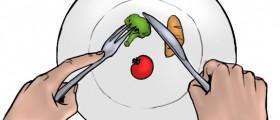Low Carb Dieting Report
Diets that are low in carbohydrates have proven to be ineffective in causing prolonged loss of weight, but can heighten the risk for adverse medical problems. Information from the Partnership for Essential Nutrition provided evidence that such diets can cause stress to the kidneys, gout and liver disorder, as well as potentially heightening the chance of getting a stroke, diabetes and multiple kinds of cancer. Certain side effects such as intense constipation, gastrointestinal issues, repetitive headaches, nausea and energy loss and concentration difficulty were also tied to low carb dieting.

This association is made up from The Alliance for Aging Research, The American Association of Diabetes Educators, The American Institute for Cancer Research, American Obesity Association, National Consumers League, National Women's Health Resource Center, Pennington Biomedical Research Center, Shape Up America, Society for Women's Health Research, University of California at Davis, and Yale-Griffin Prevention Research Center.
Barbara J. Moore, PhD, claims that low carbohydrate diets go against the years of concrete scientific findings that suggest reducing saturated fat intake and increasing fruit, vegetable and fiber intake. She goes on to mention the fact that any restrictions on carbohydrate amounts can cause stress to the vital organs and can alter the metabolism of the brain, without benefiting any other aspect in return.
Dr Moore also stated that, weight loss attributed to low carb diets, have a ’’bounce back’’ effect causing the weight to be re-gained. An issue arises with dieting that sends the body into ketosis, the brain subjected to carbohydrate deprivation, forcing the metabolism protein within the muscles and the metabolic breakdown of fat. These diets are also known to cause dehydration, harming the kidneys and even increasing chances of osteoporosis.
Review percentages on low carb diets
The Opinion Research Corporation (ORC) surveyed 1,017 adult and came to the conclusion that 19 percent of adult persons attempting to lose weight approach this by decreasing the volume of carbohydrates consumed. Non-beneficial decisions on diet are also increased after low carb diets, with 50 percent questioned eating more steak and 30 percent including more bacon in their meals, while 43 percent consume less fruit. Less vegetables, whole grain and low-fat dairy products are also consumed as a consequence. 68 percent queried have two or less servings of fruit a day and with 63 percent being the rate of vegetable consumption, in two or less servings. Finally, the three suggested daily portions of low-fat dairy products are only consumed by 71 percent researched subjects, with 15 percent avoiding them completely.
This survey also shows that 47 percent of Americans falsely believe that low-carb diets lead to weight loss with no calorie cutting involved, and 21 percent of Americans are aware of the incompatibility of such diets with diabetes inflicted persons, even though carbohydrates are implicitly suggested as a part of a diabetic’s diet.
The Institute of Medicine (part of the National Academy of Sciences) gave out a guideline listing the amount of carbs consumed daily should be 130 grams minimum for kids, but this fact was known to but 19 percent of persons quarried. 51 percent trust that adults require much less, and 21 percent had no knowledge on the subject, with but 10 percent having the opinion that adults require more.

















Your thoughts on this
Loading...